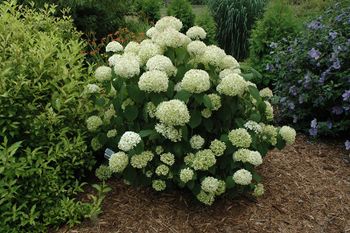Hydrangea
Other Names : Hortensia, Hydrangea arborescens
The hydrangea plant is an herbaceous, perennial shrub recognized by its beautiful white, snowball-shaped blooms. A popular ornamental, botanical, and horticultural plant, there are over twenty varieties of hydrangea worldwide. The most popular variety, Macrophylla, is a bluish-bloomed flowering plant found in the United States and Asia and appreciated for its aesthetic and health-promoting qualities. There are four to five varieties predominant to North America, with the Arborescens being the most coveted for its therapeutic properties. “Smooth hydrangea” and “seven bark” are two commonly-associated names for this hydrangea variety. Found in damp conditions along the East Coast, this wild hydrangea has been used for years as a healing remedy for many health issues. It was an esteemed herbal remedy among the Cherokee Native Americans as well as settlers in the colonial era for kidney stones.
See also : Chang Shan
Contents
Special Precautions of Hydrangea
Caution is advised when using hydrangea. Hydrangea may add to the effects of blood sugar balancing, antifungal, anti-malarial, antihistamine and cholesterol-lowering drugs, and drugs taken to prevent. Pregnant or breastfeeding women should not use hydrangea root medicinally. Discuss hydrangea treatment with a qualified health practitioner prior to its use.
Health Benefits and uses of Hydrangea are
This plant is rich in minerals such as calcium, magnesium, potassium, iron, sulfur and phosphorus. The root of Hydrangea has high level of flavonoids, quercetin, kaempferl, volatile oil and saponin that prevents cell damage.
- Auto-immune Disorders : There are several anecdotal and scientifically supported medical uses associated with hydrangea root. In 2009, researchers discovered one of the root's active components, halofuginone, fights autoimmune disorders while still allowing the immune system to function normally. This discovery, in a study published in "Science," one autoimmune disorder the treatment is used for is scleroderma, a potentially fatal disease that causes excess collagen production, which can lead to disfigurement, according to Doctor's Guide.
- Anecdotal reports indicate hydrangea treats the following disorders: malaria, enlarged prostate, Kidney Stones, blood sugar imbalances and male pattern baldness.
- Kidney Stones (Renal Calculi) : Hydrangea is a lithotrophic, diuretic, and tonic herb. Lithotrophic herbs are known for their action against stones. As a diuretic, hydrangea may help increase urine flow. It is believed by many traditional healers that hydrangea supports kidney function by helping waste removal and hormone secretion. Hydrangin, a naturally-occurring phytochemical solvent in hydrangea, has long been theorized as being the primary constituent that makes the plant effective against kidney stones.
- Other therapeutic phytochemicals in hydrangea include flavonoids such as kaempferol and quercetin. A mineral-rich plant, hydrangea contains calcium, magnesium, phosphorous, and sulfur and its minerals are believed to contribute to a vital state of health.
Combinations
Many people consume the herb for therapeutic benefit by steeping the root and rhizomes in boiling water for three to five minutes and straining the mixture to make a tea. Many teas and tinctures containing hydrangea include other herbal extracts that also promote kidney health, such as gravel root, dandelion, uva ursi, and chanca piedra.
References
- Laidley, J. On Hydrangea arborescens. Amer. J. Pharm., o.s. 18 (1852): 13-30.
- Marius Rademaker. Occupational contact dermatitis to hydrangea. Australasian Journal of Dermatology. (2003) 44, 220-221.
